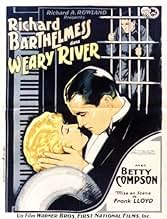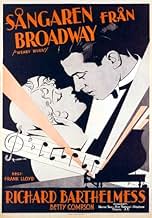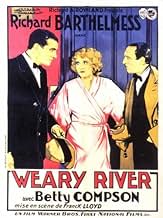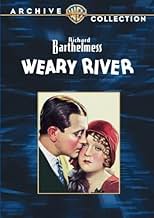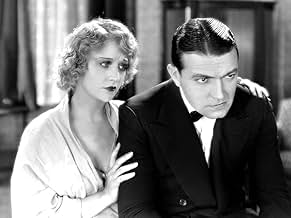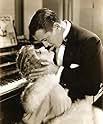Ajouter une intrigue dans votre langueA gangster is put in prison, but finds salvation through music while serving his time. Again on the outside, he finds success elusive and temptations abound.A gangster is put in prison, but finds salvation through music while serving his time. Again on the outside, he finds success elusive and temptations abound.A gangster is put in prison, but finds salvation through music while serving his time. Again on the outside, he finds success elusive and temptations abound.
- Réalisation
- Scénario
- Casting principal
- Nommé pour 1 Oscar
- 2 victoires et 1 nomination au total
George E. Stone
- Blackie
- (as George Stone)
Ray Turner
- Elevator Boy
- (as Raymond Turner)
Ernie Adams
- Ex-Con in Alley
- (non crédité)
Brooks Benedict
- Jerry's Guest
- (non crédité)
Ruth Cherrington
- Actress Backstage Who Locks Her Door
- (non crédité)
James Conaty
- Attorney at Trial
- (non crédité)
Richard Cramer
- Prison Radio Announcer
- (non crédité)
Oliver Cross
- Restaurant Patron
- (non crédité)
Edwards Davis
- Prison Chaplain
- (non crédité)
Sally Eilers
- Hatcheck Girl
- (non crédité)
Jim Farley
- Plainclothesman with Sergeant
- (non crédité)
Sherry Hall
- Prison Phone Operator
- (non crédité)
Chuck Hamilton
- Prison Photographer
- (non crédité)
Avis à la une
"Weary River" is what you might call a transitional style movie from Warner Brothers/Vitaphone. While it's not truly a full talking picture since much of it is silent and uses intertitles, some of it is sound--a bit of the dialog and the songs. This is exactly what they did previously with "The Jazz Singer" and by 1929, they'd finally be making all sound pictures. So, many of the films from the studio in 1928 would be like this...providing enough sound to please the masses...for now.
Jerry (Richard Barthelmess) is a gangster, though he dresses nice and doesn't look or sound like one. His life of crime eventually catches up to him and he's sent to prison. The warden of the place is an odd one--very progressive for the time and dedicated to fixing the cons who can be fixed. As for Jerry, he's initially dubious but soon finds a niche leading the prison's orchestra and writing music. He's so successful that he eventually becomes a radio sensation and one of his songs is a hit. Soon, he's released from prison. However, there's a strong pull from his old life--and when he finds out who set him up, he's mad enough to kill. What's next? And, how does the old warden enter the picture?
This film suffers a bit here and there because the movie is a tad overly melodramatic. And, the story wraps up too quickly and easily. Still, for the time, it's a very good picture and worth your time.
Jerry (Richard Barthelmess) is a gangster, though he dresses nice and doesn't look or sound like one. His life of crime eventually catches up to him and he's sent to prison. The warden of the place is an odd one--very progressive for the time and dedicated to fixing the cons who can be fixed. As for Jerry, he's initially dubious but soon finds a niche leading the prison's orchestra and writing music. He's so successful that he eventually becomes a radio sensation and one of his songs is a hit. Soon, he's released from prison. However, there's a strong pull from his old life--and when he finds out who set him up, he's mad enough to kill. What's next? And, how does the old warden enter the picture?
This film suffers a bit here and there because the movie is a tad overly melodramatic. And, the story wraps up too quickly and easily. Still, for the time, it's a very good picture and worth your time.
Turner Classic Movies presented "Weary River" in March of 2003 as part of its month of Oscar. I found it intriguing, even enjoyable. Partly because it was half-silent and half-sound, I was intrigued, since I have a deep and abiding interest in the earliest films. I enjoyed it for that reason, and because the story itself was, at the very least, pleasant, if not totally believable and realistic. Betty Compson, who played Alice, had a remarkably cute way of speaking, and whenever she called to her lover Jerry, played by Richard Barthelmess, she pronounced it "Jer-wy," which I found endearing. Great cinema? Perhaps not, but one I would like to see again, if only to prove to myself whether Barthelmess did his own singing. And to watch and hear the adorable Betty Compson.
The years 1928 to 1930 were perhaps the crappiest couple of years in movie history. This is the period during which films transitioned from silent to sound and the learning curve was steep for most. "Weary River" is one of the better transitional films, as it actually feels like a movie and not a sound stage-bound play.
This film is actually part silent and part sound, though the ratio is about 80/20 talking to silent. Richard Barthelmess and Betty Compson prove themselves to be decent talking actors, though neither went on to have substantial careers in the new medium. The material they're given is still of the melodramatic silent movie kind, so they can only do so much with it. But the film bucks some of the trends that make other early talkies such bores. For one, the camera actually moves, whereas most early talkies find the actors standing in one spot with a stationary camera planted squarely in the middle of the frame. Also, this film has nearly constant underscoring like a silent film would have, which reduces the amount of dead air that plagues many early sound films and causes them to have such stilted pacing. The silent/sound hybrid is weird to watch -- there's no narrative reason for some parts to have titles while others are spoken -- but it's like the fact that this film couldn't quite commit to being a complete talkie made it a better sound film than it would otherwise have been.
The title of the film comes from a song that Barthelmess's ex-con character makes famous and that launches his reformed life as a radio singer, a song which I hope you like because Barthelmess warbles it in its entirety for what feels like a dozen times.
"Weary River" was one of three films that brought Frank Lloyd a Best Director Oscar nomination in the 1928-29 award year, the other two being "The Divine Lady" and "Drag." This was a weird year for Oscar. Technically, there weren't any nominations; at the awards ceremony, only winners were announced in each category. I'm not sure how people knew to show up for the ceremony if they weren't officially nominated, but that's something to figure out some other day I guess. But historical documents have since suggested what films were being considered in each category, and "Weary River" was included in Best Director. Frank Lloyd did win, but he won only for "The Divine Lady," as it seems that, though an artist could be nominated for multiple films, the voters were able to show preference for what film actually went with the award.
A bit of trivia -- Lloyd was only the second and last person to win a Best Director Oscar for a film not also nominated for Best Picture (Lewis Milestone was the first, for "Two Arabian Knights" from the previous year, though the first Oscar ceremony included two Best Director awards, one for dramatic films and one for comedies, so it's no an exact comparison).
Grade: B-
This film is actually part silent and part sound, though the ratio is about 80/20 talking to silent. Richard Barthelmess and Betty Compson prove themselves to be decent talking actors, though neither went on to have substantial careers in the new medium. The material they're given is still of the melodramatic silent movie kind, so they can only do so much with it. But the film bucks some of the trends that make other early talkies such bores. For one, the camera actually moves, whereas most early talkies find the actors standing in one spot with a stationary camera planted squarely in the middle of the frame. Also, this film has nearly constant underscoring like a silent film would have, which reduces the amount of dead air that plagues many early sound films and causes them to have such stilted pacing. The silent/sound hybrid is weird to watch -- there's no narrative reason for some parts to have titles while others are spoken -- but it's like the fact that this film couldn't quite commit to being a complete talkie made it a better sound film than it would otherwise have been.
The title of the film comes from a song that Barthelmess's ex-con character makes famous and that launches his reformed life as a radio singer, a song which I hope you like because Barthelmess warbles it in its entirety for what feels like a dozen times.
"Weary River" was one of three films that brought Frank Lloyd a Best Director Oscar nomination in the 1928-29 award year, the other two being "The Divine Lady" and "Drag." This was a weird year for Oscar. Technically, there weren't any nominations; at the awards ceremony, only winners were announced in each category. I'm not sure how people knew to show up for the ceremony if they weren't officially nominated, but that's something to figure out some other day I guess. But historical documents have since suggested what films were being considered in each category, and "Weary River" was included in Best Director. Frank Lloyd did win, but he won only for "The Divine Lady," as it seems that, though an artist could be nominated for multiple films, the voters were able to show preference for what film actually went with the award.
A bit of trivia -- Lloyd was only the second and last person to win a Best Director Oscar for a film not also nominated for Best Picture (Lewis Milestone was the first, for "Two Arabian Knights" from the previous year, though the first Oscar ceremony included two Best Director awards, one for dramatic films and one for comedies, so it's no an exact comparison).
Grade: B-
WEARY RIVER (First National Pictures, 1929), a Richard A. Rowland Presentation directed by Frank Lloyd, stars Richard Barthelmess, a popular leading of the silent screen, in this part-silent/part talking 90 minute production produced during the dawn of sound (1927-1929). Regardless of its name, WEARY RIVER is actually a title tune that bears no reference to a river that's weary. While Barthelmess shows great promise that would soon lead to his future in talkies, his singing would not become his forte, considering the fact that his vocalization was reportedly dubbed by another. Basically a crime-melodrama with mix of prison theme and music, WEARY RIVER is quite an entertaining product made entertaining most through its silent orchestral underscoring credited by musical director, Louis Silvers.
Based on the story by Courtney Ryler-Cooper, the plot introduces Jerry Larrabee (Richard Barthelmess), a well-known bootlegger, escorting his steady girlfriend, Alice Gray (Betty Compson) to the Literary Club (for Members only). He soon leaves Alice following a phone call to attend to business regarding Spadoni (Louis Natheaux), a rival gangster gunning for his territory. With an innocent bystander killed during a rumble, Jerry is placed under arrest by his friend (Robert Emmett O'Connor), a police sergeant, accompanied by a detective (James Farley). Jerry stands trial where he is sentenced to serve one to ten years at Laboring Prison. Going under the number of 46039, Jerry becomes a rebellious prisoner until the kindly Warden (William Holden) gives him every chance to change his ways. For Jerry to become a better person, the Warden advises the visiting Alice not to see him again, with the belief that it would be better for Jerry to break all connections with his past. During the course of time, Jerry becomes a songwriter who forms a prison band, broadcasting his latest composition "Weary River," broadcast over the WDCB Radio station, to much success, becoming well known under his new title, "Master of Melody." Upon his prison release for good behavior, Jerry becomes a vaudeville singer vocalizing his signature, "Weary River." Because of his prison record, Jerry finds it difficult adjusting to his new life on the outside, especially with temptation of returning to his life of crime for avenging on the man who framed him. Others featured in the cast are George E. Stone ("Blackie"), Raymond Turner (The Elevator Boy); Gladden James (The Manager); Lee Moran (The Hoofer); and Ernie Adams.
Aside from the tune "Weary River" being vocalized four times and underscored numerously (including during closing exit music) enough for viewers to become song weary before the movie ends, the performance given by Barthelmess and Compson are well acted, even if considered old-style by contemporary viewers. Barthelmess also sings briefly "Frankie and Johnny" along with another tune titled "It's Up to You." Based on the plot summary of a convict becoming a radio singer through broadcast hook-up from the prison, one cannot help but think about a similar themed story of SAY IT WITH SONGS (1929) starring Al Jolson. Had Jolson starred in WEARY RIVER instead, with he singing more songs that the oft-repeated title tune, it would have benefitted his performing style here more than the poorly written and his badly acted performance that has often labeled SAY IT WITH SONGS, regardless of some potential, to be Jolson's worst movie. Interestingly, Frank Lloyd was nominated for an Academy Award for Best Director for this and two other productions, DRAG (with Barthelmess) and THE DIVINE LADY (winner). William Holden (not the famous actor in later years) is commendable as the sympathetic warden while shadowy images of guards leading convict to his execution is well done.
Reportedly WEARY RIVER went through a long and tedious process of restoration in recent years, a challenge that paid off. Unavailable for viewing in decades, and with part-talkies seldom given any sort of revivals since its original release, WEARY RIVER resurfaced intact on Turner Classic Movies (TCM premiere: August 24, 1997), and has become available on DVD for anyone interested in movies during its transformation from silent to sound. (***).
Based on the story by Courtney Ryler-Cooper, the plot introduces Jerry Larrabee (Richard Barthelmess), a well-known bootlegger, escorting his steady girlfriend, Alice Gray (Betty Compson) to the Literary Club (for Members only). He soon leaves Alice following a phone call to attend to business regarding Spadoni (Louis Natheaux), a rival gangster gunning for his territory. With an innocent bystander killed during a rumble, Jerry is placed under arrest by his friend (Robert Emmett O'Connor), a police sergeant, accompanied by a detective (James Farley). Jerry stands trial where he is sentenced to serve one to ten years at Laboring Prison. Going under the number of 46039, Jerry becomes a rebellious prisoner until the kindly Warden (William Holden) gives him every chance to change his ways. For Jerry to become a better person, the Warden advises the visiting Alice not to see him again, with the belief that it would be better for Jerry to break all connections with his past. During the course of time, Jerry becomes a songwriter who forms a prison band, broadcasting his latest composition "Weary River," broadcast over the WDCB Radio station, to much success, becoming well known under his new title, "Master of Melody." Upon his prison release for good behavior, Jerry becomes a vaudeville singer vocalizing his signature, "Weary River." Because of his prison record, Jerry finds it difficult adjusting to his new life on the outside, especially with temptation of returning to his life of crime for avenging on the man who framed him. Others featured in the cast are George E. Stone ("Blackie"), Raymond Turner (The Elevator Boy); Gladden James (The Manager); Lee Moran (The Hoofer); and Ernie Adams.
Aside from the tune "Weary River" being vocalized four times and underscored numerously (including during closing exit music) enough for viewers to become song weary before the movie ends, the performance given by Barthelmess and Compson are well acted, even if considered old-style by contemporary viewers. Barthelmess also sings briefly "Frankie and Johnny" along with another tune titled "It's Up to You." Based on the plot summary of a convict becoming a radio singer through broadcast hook-up from the prison, one cannot help but think about a similar themed story of SAY IT WITH SONGS (1929) starring Al Jolson. Had Jolson starred in WEARY RIVER instead, with he singing more songs that the oft-repeated title tune, it would have benefitted his performing style here more than the poorly written and his badly acted performance that has often labeled SAY IT WITH SONGS, regardless of some potential, to be Jolson's worst movie. Interestingly, Frank Lloyd was nominated for an Academy Award for Best Director for this and two other productions, DRAG (with Barthelmess) and THE DIVINE LADY (winner). William Holden (not the famous actor in later years) is commendable as the sympathetic warden while shadowy images of guards leading convict to his execution is well done.
Reportedly WEARY RIVER went through a long and tedious process of restoration in recent years, a challenge that paid off. Unavailable for viewing in decades, and with part-talkies seldom given any sort of revivals since its original release, WEARY RIVER resurfaced intact on Turner Classic Movies (TCM premiere: August 24, 1997), and has become available on DVD for anyone interested in movies during its transformation from silent to sound. (***).
Singing gangster Richard Barthelmess (as Jerry Larrabee) is sent "up the river" after an innocent bystander is killed in one of his orchestrated shoot 'em ups. In prison, Mr. Barthelmess (#46039) has more time for singing and less time for racketeering. He becomes a hit in the big house and decides to go straight on the outside. But, after serving his time, Barthelmess receives a rocky reception. While a wonderful singer, he's derided as an ex-con. Through it all, Barthelmess is encouraged by beautiful blonde Betty Compson (as Alice Gray). She and warden William Holden would like Barthelmess to keep trying, but he is tempted by his criminal past...
"Weary River" is a part-talking, part-silent film. It begins as a silent, with oddly primitive background music (for 1929), and turns "talkie" early in the running time. You're thinking it will remain there, but the silent style occasionally returns. Perhaps the soundtrack on these scenes was inferior and re-takes unsatisfactory. While mostly a sound film, the spirit is silent; this may be why the technology appears superior to many other early talkies. The possibly better all-silent version should be restored, if possible...
Then a very big star, Barthelmess maintained his standing during the transition from silent to sound. His voice was fine, but Barthelmess is obviously better in the older style. Barthelmess also mouths his songs for a vocal double. Taken from this film, the song "Weary River" was a big hit for the popular new singer Rudy Vallee. Randolph Scott and Sally Eilers are extras and elevator "boy" Raymond Turner looks frightened. Director Frank Lloyd's artful prison sequences require no dialogue, and photographer Ernie Haller is an obvious asset. Their assistant Alvin Knechtel was killed in a plane crash, sadly, on the verge of a promising career.
***** Weary River (2/10/29) Frank Lloyd ~ Richard Barthelmess, Betty Compson, William Holden, Louis Natheaux
"Weary River" is a part-talking, part-silent film. It begins as a silent, with oddly primitive background music (for 1929), and turns "talkie" early in the running time. You're thinking it will remain there, but the silent style occasionally returns. Perhaps the soundtrack on these scenes was inferior and re-takes unsatisfactory. While mostly a sound film, the spirit is silent; this may be why the technology appears superior to many other early talkies. The possibly better all-silent version should be restored, if possible...
Then a very big star, Barthelmess maintained his standing during the transition from silent to sound. His voice was fine, but Barthelmess is obviously better in the older style. Barthelmess also mouths his songs for a vocal double. Taken from this film, the song "Weary River" was a big hit for the popular new singer Rudy Vallee. Randolph Scott and Sally Eilers are extras and elevator "boy" Raymond Turner looks frightened. Director Frank Lloyd's artful prison sequences require no dialogue, and photographer Ernie Haller is an obvious asset. Their assistant Alvin Knechtel was killed in a plane crash, sadly, on the verge of a promising career.
***** Weary River (2/10/29) Frank Lloyd ~ Richard Barthelmess, Betty Compson, William Holden, Louis Natheaux
Le saviez-vous
- AnecdotesThe film is part silent, with intertitles, and part sound, which was important to feature the main character's talent as a singer, although the title song Weary River was nevertheless dubbed by a professional singer. One scene near the end features an orchestra playing on-screen on set that is a radio studio, while traditional silent movie sound is substituted for real sound. Then the scene technology audibly changes to sound recorded on film, with the same orchestra appearing to play for real (possibly dubbed) as the main character begins to sing (although he is listed as dubbed) in a radio performance that prompts his sweetheart to call the radio studio. The scene is an unusual mix of technologies during a period of transition from silents to sound.
- GaffesWhen Jerry Larrabee is brought in to the prison bathroom, there is already an inmate having a bath, who has disappeared before the scene is over.
- Citations
Prison Warden: Oh, I know how you feel. But, things won't be half as bad if you'll only play ball with us.
- Versions alternativesFirst National also released this film in a silent version.
- Bandes originalesWeary River
(1929)
Music by Louis Silvers
Lyrics by Grant Clarke
Sung by Richard Barthelmess (dubbed by Johnny Murray)
Meilleurs choix
Connectez-vous pour évaluer et suivre la liste de favoris afin de recevoir des recommandations personnalisées
Détails
- Date de sortie
- Pays d’origine
- Langue
- Aussi connu sous le nom de
- Weary River
- Lieux de tournage
- Société de production
- Voir plus de crédits d'entreprise sur IMDbPro
- Durée1 heure 26 minutes
- Couleur
- Rapport de forme
- 1.33 : 1
Contribuer à cette page
Suggérer une modification ou ajouter du contenu manquant

Lacune principale
By what name was Le torrent fatal (1929) officially released in India in English?
Répondre
